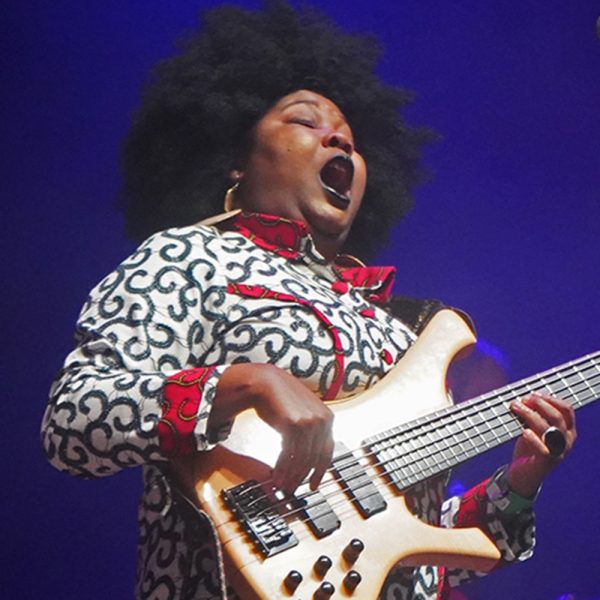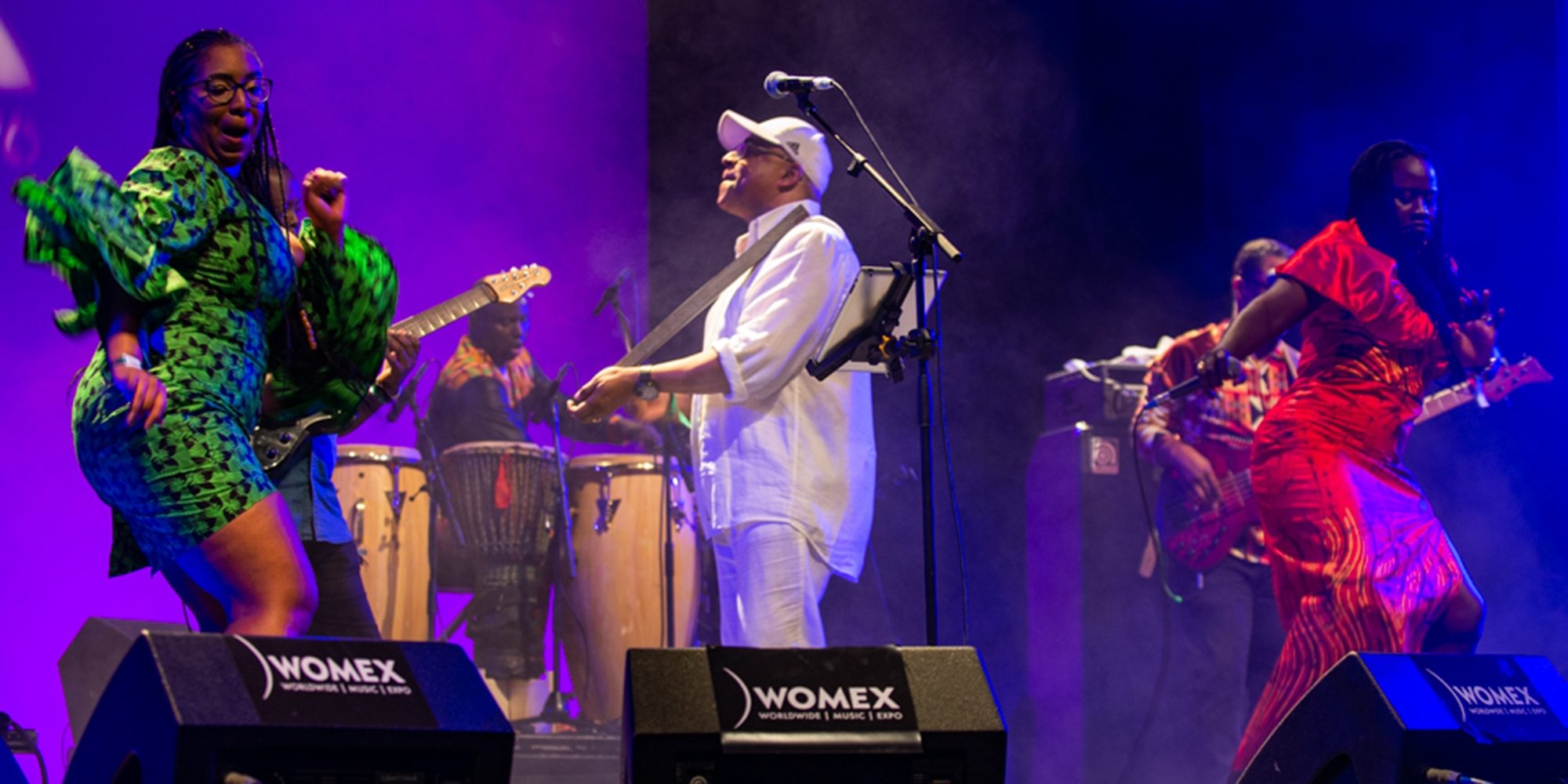One of the standout live acts at the 2021 WOMEX was Bandé Gamboa, a collective band of ace musicians from Guinea-Bissau and Cape Verde performing a mix of Cape Verdean funaná and Guinea-Bissau gumbe music. The gumbe connection immediately grabbed our attention in light of our 2020 radio program's deep dive into that genre’s pre-history, The Gumbe Story. At WOMEX, Afropop’s Banning Eyre spoke with Bandé Gamboa’s producer Francisco “Fininho” Sousa shortly before the band performed an enchanting live showcase. We wanted to learn more about the project and its links to the larger gumbe phenomenon. A fascinating new aspect to that story emerged. Here’s their conversation.
Banning Eyre: Francisco, it’s very good to meet you. To start, please introduce yourself.
Francisco Sousa: I am Francisco “Fininho” Sousa. Fininho is the name I'm known by in the music industry. It means “slim.” I’ve been slimmer, but I still keep the name. Anyway, I used to be a crate-digger and a DJ, and now I've moved on with this project to be a producer and create projects with bands. I have never worked with non-African bands. I work mainly with bands from Cape Verde and Guinea-Bissau, and also from Angola. What I did this time was to create a project for the French record label Heavenly Sweetness. They contacted me in 2018. Actually it was Guts—a famous French producer—who looked for me. I was not on any social media at the time. I had just moved back to Lisbon, and he rang my bell, and he said, "I want you to make a project for us." The label knew the compilation I was involved with called Space Echo for Analog Africa.
I know it. A very interesting compilation.
That was me. Actually, that one was re-edited five times, and one of the label guys was really blown away by that release. At first, they wanted a compilation, but I was not really into another compilation. I was getting a bit tired of this digging thing. In Lisbon, what happened was I couldn't afford to dig anymore, because it had just became fashionable and everybody was traveling to Lisbon from Japan, from Germany, and the prices went up. I hadn't bought records for a year, and now they were going for €200. Just from one year to another.
Wow. When was that?
From 2011 to 2014, it was already crazy. I couldn't handle that competition. I remember we went to a flea market and the record seller was telling me, “I know this is just €25, but the guy from Japan gives €50. What can I do?” He was right. The whole scene was a bit strange, but we were outpaced.
So then I started using that knowledge. I think even if I could've afforded it, I wouldn't have continued, because you just move on in life. Then I also started getting a little bit annoyed by all of this tropical music scene, because ironic as it was, it was not diverse enough. You just see musicians with colored shirts and you don't see the diversity. Colored shirts are fine if you're involved in something else, and you have a higher level of thinking, and you want to really learn what the other guy does. But I started realizing that this African vintage stuff is more from a European imagination, where these guys are dressing up in these disco types of outfits, and these bands are playing the same thing. In reality, most Europeans consume African music that is close to what they know: disco and funk. But if you're involved with African music—and you know this as a digger yourself—you have to go a lot deeper.
For me, it's a responsibility. I live in the city that was the capital of an empire that enslaved millions of people. So if you work with this music, you have a responsibility, a lot of it. It's not, "I don't have to read the books." No, no. You do have to read the books. You have no choice. Otherwise, do something else. Work with punk or something. So this was just to say I started wanting to work with musicians now. We have musicians now, older and younger, in Lisbon. Basically, the musical elites of Lusophone Africa are in Lisbon. They're also in other cities. But it's a big resource. You have to use it. So because I have a past as a digger, I have to use that knowledge I have as a digger also, and then join it with live bands now. So that's what the project is.
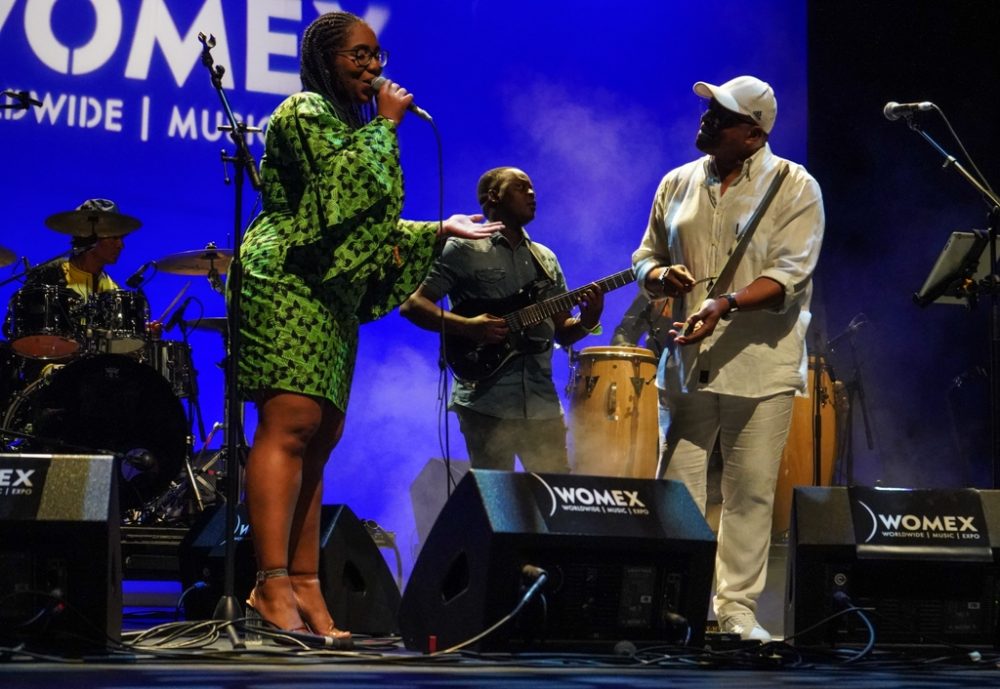
Very interesting. So how did you find the musicians and the bands?
I knew them, because I used to organize concerts.
So coming to Bandé Gamboa, were these musicians who knew each other and had worked together before?
I chose the directors, because there are actually two bands. In the recording, there are two bands, 17 musicians. There's the band of Amílcar Cabral (1924-73), who is a figure of the liberation movement of Guinea-Bissau and Cape Verde, because he's from both countries. He was an absolutely brilliant guy, but in Portugal he's totally invisible. He's still seen a bit as an enemy of the state. He got funding from the Soviet Union at the time, but he was a humanist. When you talk about debating, he humiliated the dictator of Portugal, except that what he said didn’t come on the news. But intellectually, he completely outpaced the regime.
This is in the 1970s.
Yes. The 1970s. It started in the ‘60s, but until 1974 when the dictatorship was thrown out, the only thing people in Portugal said about Amílcar Cabral was, “This guy is a criminal, just like any thug.” And then you ignore all of the theory that he was expressing. The African mind just wants to be itself. That's it. That's why revolution is a cultural act. You just want to be yourself. You don't want to have somebody saying what you can listen to or think. That's it. But this message is invisible in Portugal. It's got many dimensions, the political dimension, and the joining of the two countries. Amílcar Cabral wanted Cape Verde and Guinea-Bissau to be only one country, and then in 1990 there was a coup d'état, and then there were two countries. Some people still dream about that.
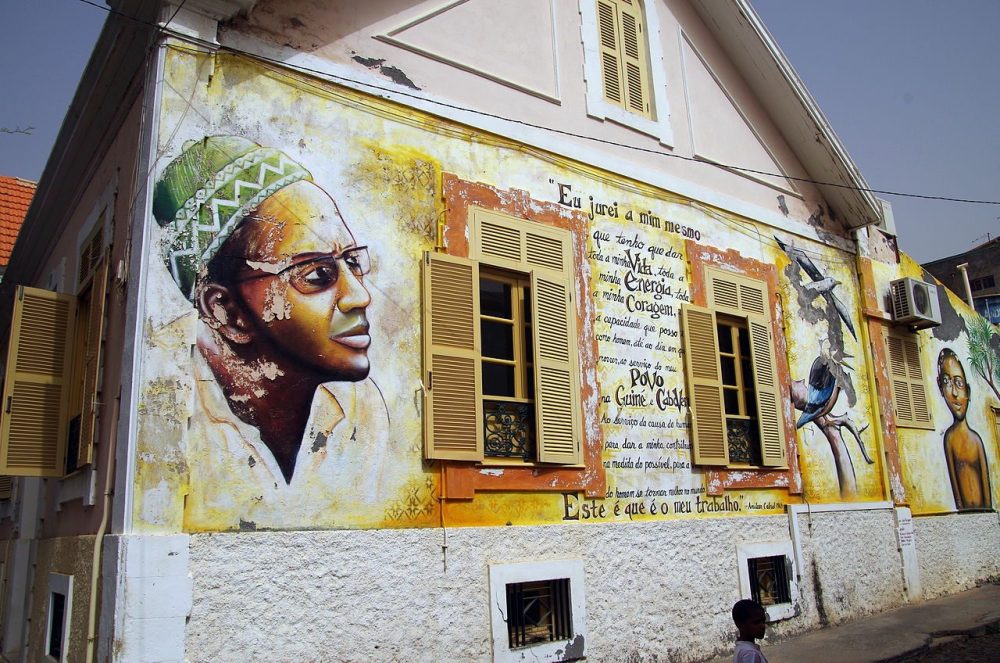
A few years ago I met the singer Fatou Diakité, born in Guinea-Bissau, raised in Cape Verde, but with a Malian surname. She explained to me some of this history. She also talked about Guinea-Bissau gumbe. So let's talk about that. Why did you choose gumbe as a focus for this band?
Let’s start with the name. Bandé is a neighborhood in Bissau, the capital of Guinea-Bissau. It's very, very lively. I've been there. It's fantastic, because they have 32 ethnicities, but just one and a half million people. It's a very small country with 32 ethnicities, each with their own traditions, their own way of dressing, their own rhythms, their own language. Bissau is where everybody gets together. And Gamboa is the beach of Gamboa on Santiago Island in the Cape Verdean archipelago. Santiago is the only island where there were slavers and that's the beach there, so it's a connection. It's not exactly where the slaves were carried, but it's just around the corner, so we cannot forget that this has a story of enslavement and suffering behind it, and this has to be a dimension of the music. Like I said, we have a responsibility.
O.K. So how does gumbe music fit in, in terms of the sound, but also the identity of the band?
It's got two dimensions, gumbe and funana. So half the tracks are of the band from Cape Verde (funana), and half from the band of Guinea-Bissau (gumbe). So they mix the two styles. There is an album that came out in 2020. It’s called Horizonte.
I would love to hear it.
I will send it to you. [And he did!]
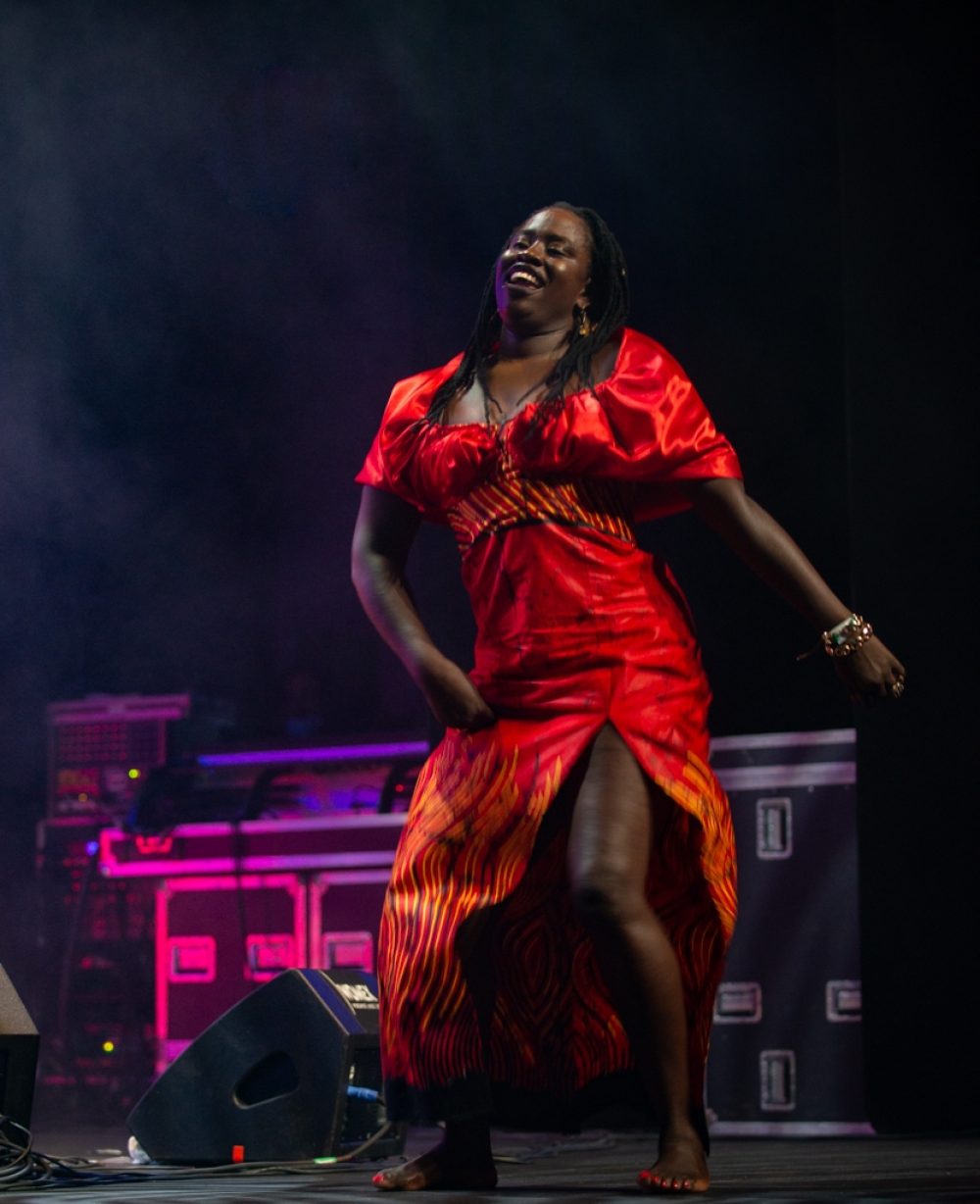
So as you know, we recently did a program on the deep old history of gumbe. Tell me about gumbe as it is understood by these musicians from Guinea-Bissau.
In Cape Verde, it's just a music from Guinea-Bissau. In Guinea-Bissau, it's their music. But when you listen to the gumbe—and there are also other names for it—when you compare the gumbe of Guinea-Bissau with all of the other ones from West Africa, it has a Latin side. When you talk about the most traditional musicians in Guinea-Bissau, when you go to villages and small towns, you listen to salsa, pure salsa. The musicians are playing it. I have a friend who is probably one of the greatest kora players in Guinea-Bissau, and half of his tracks are salsa. You can listen to it, to that Cuban influence.
So I asked the musicians, “Where did this is come from?” There were many hypotheses. There's really nothing solid. There are scholars who have looked at it, but I've never heard any definitive answer. Some people said there was a special channel in the ‘50s and ‘60s where they could get records from Latin America.
Part of the story has to be the Cuban GV record series which arrived pretty much simultaneously in West African cities in the 1930s.
Yes. Yes. For sure that's part of it. But there is another hypothesis from Ariel de Bigault, a great French researcher of the music of Angola especially. She told me that for the French to recruit soldiers from Senegal for the second world war, they built a really big radio tower in Dakar. And that station played music from everywhere, including from Latin America. I have to research this more, because I know that in Bissau, there was nothing like that on radio. Portuguese colonization was: don’t teach; no culture; nothing. All that was completely cut off. But I'm sure they could get that frequency from Dakar.
And music carries so much information, cultural information.
For sure. It must've been an influence. It was probably a mixture of many things. But you have to take into account that researching countries colonized by the Portuguese is different than with countries colonized by the English or the French. Because there is very little academic work, very few studies. One of the strategies to keep these countries stable—stable meaning quiet—was to have no schools, no universities. Education was only for whites. The first school for Africans in Guinea-Bissau was built in 1958. So this was a very powerful technique to keep people from getting organized. Amílcar Cabral was educated in Lisbon. That was the only way that could happen.
When you research these things, you find there are people who know. If you travel in Guinea-Bissau, there are people who have studied, but it's not an academic circuit like in the states or other places.
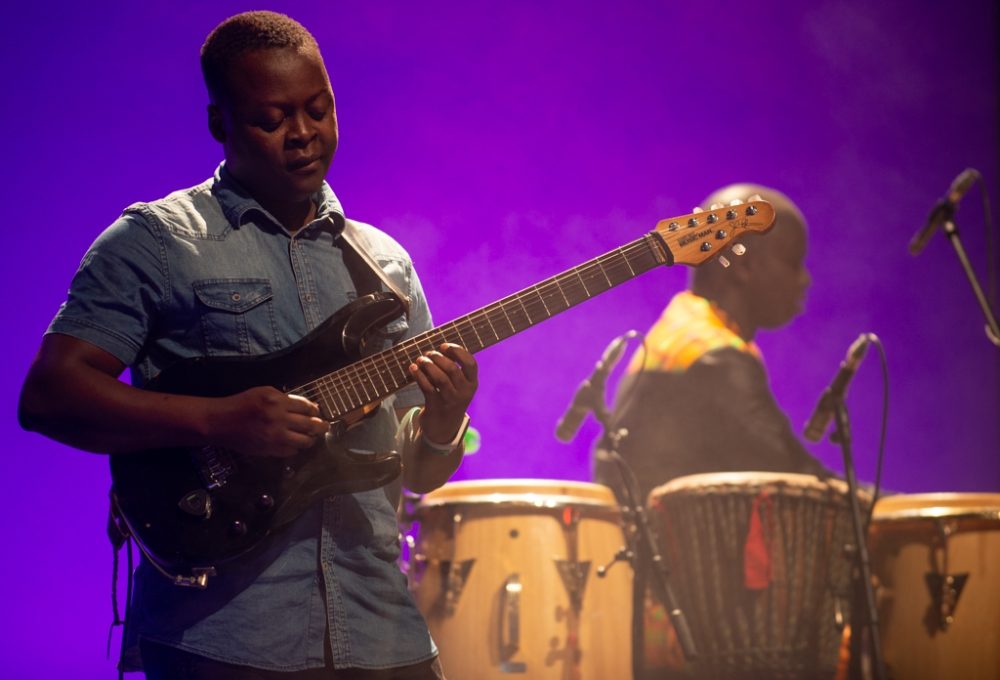
O.K., I got derailed, but I was explaining why the gumbe of Guinea-Bissau has Latin influences.
It's interesting the way the Latin influences are much more powerful in Francophone and Lusophone countries than in Anglophone ones. It's less of a factor in Ghanaian, Nigerian, Sierra Leone music. But if we think of gumbe as an extended family of styles, what you're saying is that the Guinea-Bissau branch has a particularly strong “Latin tinge” to use John Storm Roberts’ expression. But I'm curious, if you ask these musicians in Guinea-Bissau about the older story of gumbe music, what would they say about its origins?
I think they would say, quite rightly, that it comes from the ‘50s. The origin of gumbe in Guinea-Bissau is the 1950s. That is true in Guinea-Bissau. Bissau was a small city then, but it was the only city where people with different languages got together. That is a central point. When people from different ethnicities and languages come together, they create creole. Creole comes from the metropolis. So people who have studied this agree that gumbe comes from the city, and from an attempt to merge different rhythms. It's like in America where people have different things in common, and then make them come to a point of connection. But then the Latin part also, we know that it happened around the ‘50s.
But the problem is you can’t study this the way you study music from other countries, because the recorded record is very slight. Even in the ‘50s, you didn't have recording studios, and when you did, they were recording Portuguese music. So we don't know the origins, and a similar thing happened in Cape Verde. It was not until well into independent Guinea-Bissau that there were studios, and even then, there were not many quality studios. This is very unsettling, because it means that some people get to know their story, and others don't, because there are no archives. It creates a big disparity between countries, for example Nigeria and South Africa as compared with Guinea-Bissau. We don't know the culture of our own world. It was repressed. It was forbidden.
Is there a possibility of a revival of some sort? Is that happening now?
But sometimes it's too late. We have to make a very strong effort to go after these types of music, and when you do, some people just say that if you go to record in small villages in Guinea-Bissau, it's a half-baked way of researching, as if you’ve missed the point completely, when you're just trying to understand culture and make connections. We need a really big effort. I've made some attempts before, but it's not easy to find money for these things in Portugal. It's a country where money is not well managed, so you have to turn to other places and make them enthusiastic about the place you come from. It's a bit strange, but if you don't do that, nothing will happen. It's not like France where they really go for culture.
Let’s come back to the gumbe story we told in our program, going all the way back to Sierra Leone, Nova Scotia, and ultimately Jamaica. What do you think the reaction would be among your musicians to that extended narrative? Have you discussed that with them?
I haven't done it because, well, it's like if you're from the United States and I tell you that blues is from here, and not from there.
Actually, some Africans have told me that.
O.K., blues is a bad example. But you see what I mean. You don't want to tell them that their biggest cultural treasure comes from somewhere else. Actually, it's not really that way. Because the gumbe from Guinea-Bissau may have the same name, but it is from Guinea-Bissau. If you compare it with the gumbe from Sierra Leone, it's very different.
Sure. There are many styles that are known to be part of the gumbe phenomenon, but they're not called that. But one of the main identifying features is that square frame drum. Do you guys have that?
Yes. I carried it here in my car. They call it siko. I asked because the drummer, Ernesto, is sleeping in my house now in Lisbon. I asked him about it yesterday night. In Jamaica they call it gumbe, but it's the same drum. They will play it tonight.
Tell us about the band we’re going to hear tonight.
Well, we couldn't bring 17 musicians. The agent didn't like that very much. So there are eight musicians. It works a bit like a collective. Musicians sometimes get angry because you can't have all of them on stage. You try to have half/half. Sometimes it's not possible. Today were going to have more from Guinea-Bissau then Cape Verde. These are really established musicians. There's a very traditionalist approach to music in the Lusophone space. Only when you get to the top, when you’re musicians who've traveled and played in different places, do musicians get recognition.
So about the band tonight: Juvenal Cabral Is the bass player and the director. He and the singer Micas Cabral, they come from this massive band in the Lusophone space called Tabanka Djaz. That's the most successful band from the 1980s until now in Guinea-Bissau. They are like stadium-popular. They are very professional, and play a mix of gumbe with zouk. Then on the electric guitar today it's going to be Eliseu Imbana. He played with the most recent formation of Super Mama Djombo. He's a very, very talented guy. He just moved to Lisbon. It has to work like a collective. All of them are very good.
The drummer today is Tony Bat. We have three singers. One is Micas Cabral from Tabanka Djaz. He and Juvenal Cabral are nephews of Amílcar Cabral. I only learned that after the recording of the record. And there’s the keyboard player. Today it’s going to be Daya from Cape Verde. And we have two female singers, One is Iragrett Tavares from Guinea-Bissau. She just released a couple of very fresh singles. And then Debra Paris from Cape Verde. She's very young, just 21, and she is the daughter of Zé Paris who played bass for Cesaria Evora. And Ernesto da Silva is playing the frame drum.
When you're trying to make a project successful internationally, it's not a coincidence that you often end up with the same musicians. Because the musicians who really show up and do their homework, there are only a few. In the beginning I thought this was a bit outrageous. Why is it always the same guys who end up at WOMEX? And now I know. Because I've tried otherwise, and it didn't work. Actually for this project, I had different musicians not showing up for recordings four times. Everyone's waiting, and they didn't show up. Because they got nervous? I don't know why. So in the end you have to work with people who are professionals. It's not enough to have interesting ideas. In the industry, you have to perform. Otherwise you're just marginalizing the music again.
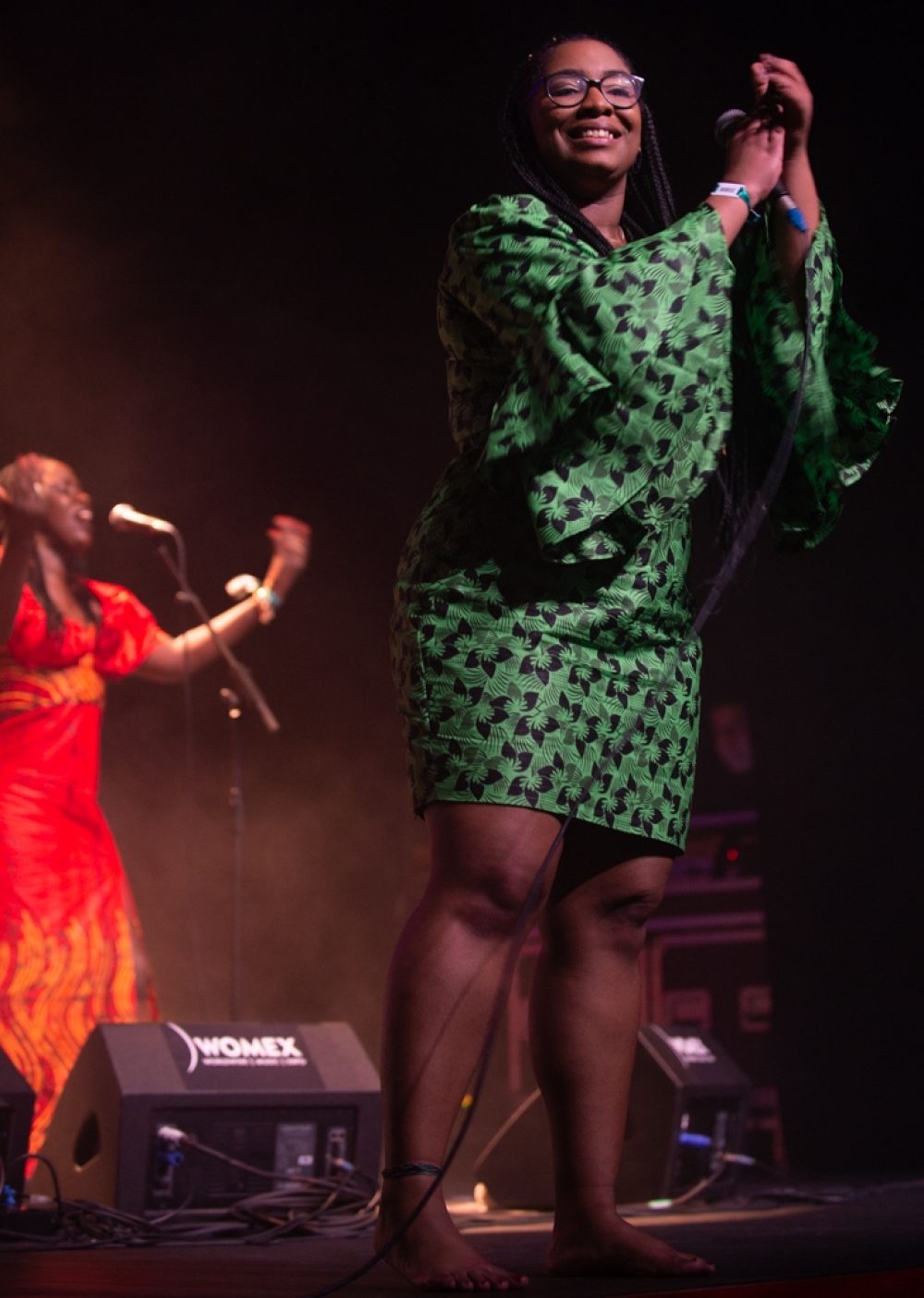
The band has done this one album. Is there a plan for a new one?
We released the album in 2020, and after that we were in the middle of the pandemic. We had to stop. Now we are looking to produce a new album. We have to record a second album. People ask me a lot about the second album. I don't know. It depends on what will happen. It depends on the quality of the compositions that we find, and also on the availability and creativity of the band, and motivation to do original tracks. Because it is a good idea to do original tracks. So let's see. The band is motivated. So a lot of things can happen. It was a good reception for this first album. We’re very happy with it.
We can't wait to hear the show tonight, and look forward to staying in touch. This is a great project.
Thank you.
Related Articles
